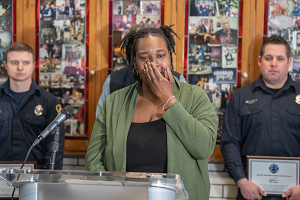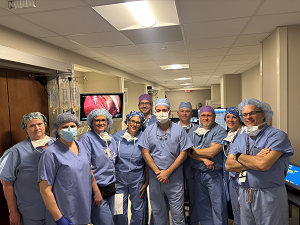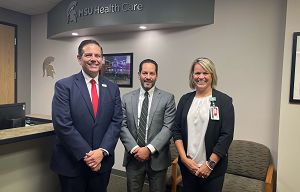World-Renowned Neurosurgeon Selected to Lead Nationally-Recognized Henry Ford Medical Group

Medical Group CEO to Also Serve as Henry Ford Health System’s New SVP and Chief Academic Officer
DETROIT - Following an extensive national search, Henry Ford Health System has selected its own Steven N. Kalkanis, M.D., to be the Chief Executive Officer of the Henry Ford Medical Group (HFMG), effective Jan. 1, 2020. He succeeds William A. Conway, M.D., who is stepping down after more than four decades with the health system.
Dr. Kalkanis will provide strategic leadership and direction over the 1,900-member group of physicians and researchers, responsible for all aspects of clinical performance across 40 specialties. Additionally, Dr. Kalkanis will also serve as Henry Ford’s Senior Vice President and Chief Academic Officer, working to advance the health system’s academic mission, including the development and advancement of all research and medical education programs.
“We are proud to welcome Dr. Steven Kalkanis to this expanded role,” said Wright L. Lassiter, III, President and CEO, Henry Ford Health System. “Not only is Steve an accomplished and recognized neurosurgeon, he is a transformational leader who can build on the strong history and tradition of the Henry Ford Medical Group. We are excited to partner with him to drive the innovative approaches for which this medical group has long been known.”
Dr. Kalkanis will also work collaboratively with health system clinical and operational leaders, as well as national and community partners to provide exceptional patient care and advance the health system’s population health and accountable care strategies. Adnan Munkarah, M.D., Henry Ford Health System’s Executive Vice President and Chief Clinical Officer, said Dr. Kalkanis brings the kind of dynamic leadership that will help Henry Ford maintain its leading role in this area. “Creating meaningful solutions for our patients and members that provide the most advanced, innovative, highest quality and safest care at the lowest possible cost cannot be done without strong, committed leadership and trusted partners. Steve is a truly collaborative leader who always acts in the best interests of his patients and their families, as well as his colleagues. We are confident that he can build critical partnerships both inside and outside our organization as we work to achieve lasting health and wellness in the communities we serve.”
Dr. Kalkanis joined Henry Ford in 2004 and is currently the Chair of the health system’s Department of Neurosurgery, ranked among the nation’s best by U.S. News and World Report. He is also the Medical Director of the Henry Ford Cancer Institute, leading the expansion of cancer care services across the system, including the spearheading of a comprehensive precision medicine and molecular tumor board program for all cancer types, and the development of the health system’s new destination cancer facility, expected to open in 2020.
“I am honored to follow in the footsteps of such a storied and respected leader of the Henry Ford Medical Group,” said Dr. Kalkanis. “To have the opportunity to be part of a compassionate and diverse culture that is relentless in its pursuit of clinical innovation, pioneering research and next generation medical education has been a privilege. In this new capacity, I am more committed than ever to stewarding transformational healthcare through a combination of precision medicine and digital advancements, distinctly personalized care, value-based solutions and a dedication to addressing the real challenges in our communities.”
An internationally recognized brain tumor expert, Dr. Kalkanis currently serves as President of the Congress of Neurological Surgeons (CNS), the largest association of its kind. In 2018, he was also named a Director of the American Board of Neurological Surgery, the official accrediting and credentialing body for all neurosurgeons practicing in the U.S. Actively involved in clinical trials and research, he leads a translational research laboratory investigating the molecular genetic differences between short and long term brain tumor survivors with the goal of refining future personalized medicine treatment protocols. He has also served as a visiting professor and guest lecturer for more than 100 national and international audiences and has authored more than 150 peer-reviewed publications.
A metro Detroit native, Dr. Kalkanis completed his neurosurgical training at Massachusetts General Hospital in Boston. He is a graduate of both Harvard University and Harvard Medical School.
###
MEDIA CONTACT: Brenda D. Craig / bcraig3@hfhs.org / 313.283.8331
About Henry Ford Health System: Under the leadership of President and CEO Wright L. Lassiter, III, Henry Ford Health System is a $7 billion integrated health system comprised of six hospitals, a health plan, and 250+ sites including medical centers, walk-in and urgent care clinics, pharmacy, eye care facilities and other healthcare retail. Established in 1915 by auto industry pioneer Henry Ford, the health system now has 32,000 employees. Henry Ford is also one of the region’s major academic medical centers, receiving between $90-$100 million in annual research funding. The health system is also an active participant in medical education and training, with programs for physicians and other health professionals including nurses, pharmacists, radiology and respiratory technicians.
About the Henry Ford Medical Group: Also founded in 1915, the Henry Ford Medical Group (HFMG) continues to be among the nation’s premier group practices, fostering innovation in patient care, education and research, while also encouraging technology advancement and process improvements to drive patient care experience and create efficiency. The group continues to rank in the 99th percentile of all group practices. One of the largest post-graduate medical education enterprises in the country, nearly 40% of all physicians currently practicing in Michigan received training at Henry Ford. The HFMG is also in the top 6% of National Institutes of Health funded research programs.
.svg?iar=0&hash=F6049510E33E4E6D8196C26CCC0A64A4)

/hfh-logo-main--white.svg?iar=0&hash=ED491CBFADFB7670FAE94559C98D7798)








